| Srl | Item |
| 1 |
ID:
118440
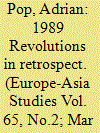

|
|
|
|
|
| Publication |
2013.
|
| Summary/Abstract |
Reminding us of the failure of academia to predict the East European revolutions, and the challenges presented by the latter to the theories of revolution, the essay claims that in order to understand why the exit from communism comprised so many varied modes, one should take a 'path-dependence' diachronic and synchronic comparative perspective. Based on this dual approach and a set of variables, the essay advances a typology of East European revolutions and argues that the issues regarding the type of political regime, the development of civil society and its way of interacting with the state are of paramount importance for comprehending how the 'negotiated revolutions' in Central Europe came about. Finally, the significance of the Central European civil society strategy under late communism for the era of globalisation is addressed.
|
|
|
|
|
|
|
|
|
|
|
|
|
|
|
|
| 2 |
ID:
118433
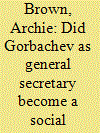

|
|
|
|
|
| Publication |
2013.
|
| Summary/Abstract |
As General Secretary, Gorbachev evolved from a Communist reformer to a socialist of the social democratic type. The most important programmatic documents of the CPSU in 1990-1991, on which Gorbachev had the predominant influence, were essentially social democratic. (Many in the Party apparatus had no intention of implementing them.) From 1988, Gorbachev was advocating fundamental change of the Soviet system, although there were zig-zags in his public pronouncements under the pressure of events. Ill-understood both at home and abroad, Gorbachev's social democratic ideas were 'outflanked' by the market fundamentalism and political impatience of his radical opponents and frustrated by the implacable enmity of conservative defenders of the vanishing Communist party-state.
|
|
|
|
|
|
|
|
|
|
|
|
|
|
|
|
| 3 |
ID:
118438
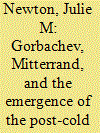

|
|
|
|
|
| Publication |
2013.
|
| Summary/Abstract |
More than two decades since the Cold War's end, the new 'united' Europe resembles the old divided one, without the ideological cleavage. Transferred farther east, the continent's re-division condemned Russia to Europe's fringes where it remains today. Some scholars trace the origins of this fault line to 1989-1990, blaming the United States, Germany and the USSR for failing to erect pan-European security foundations. Few, however, focus on the not insubstantial role of France in this story. Mikhail Gorbachev's close ties with his intellectual mentor François Mitterrand contributed to the failure in unexpected ways. This essay explains this element in the history of the pan-European idea while also shedding light on the politics behind the birth of the EU.
|
|
|
|
|
|
|
|
|
|
|
|
|
|
|
|
| 4 |
ID:
118437


|
|
|
|
|
| Publication |
2013.
|
| Summary/Abstract |
There are a striking number of similarities between the lives and deeds of Alexander Kerensky and Mikhail Gorbachev. Both came to power on the verge of the collapse of the state, the Russian empire in the case of Kerensky and the Soviet Union in the case of Gorbachev, and both initially enjoyed great popularity. Unfortunately, both also failed fully to implement their reform programmes and to hold onto power. Yet their attempts at democratisation helped to give the Russian people an opportunity to participate in creating history. By comparing their reconstructed images, the author reveals the similarities between the two politicians' lives and careers in the form of a schematic description of the consecutive stages of their careers.
|
|
|
|
|
|
|
|
|
|
|
|
|
|
|
|
| 5 |
ID:
118432


|
|
|
| 6 |
ID:
118435
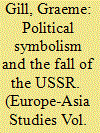

|
|
|
|
|
| Publication |
2013.
|
| Summary/Abstract |
When Gorbachev came to power he inherited not simply a system in crisis, but a structure of symbols that was embedded within the broader political system and which was also in crisis. Given the ideocratic nature of the Soviet system, any change to that system would require symbolic change as well. This essay charts how Gorbachev sought to come to grips with this problem, investing some symbols with new meaning while rejecting others. It shows how ultimately he was unable to produce a new, coherent narrative.
|
|
|
|
|
|
|
|
|
|
|
|
|
|
|
|
| 7 |
ID:
118434
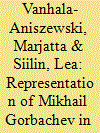

|
|
|
|
|
| Publication |
2013.
|
| Summary/Abstract |
The aim of this study is to investigate the representation of Mikhail Gorbachev in contemporary Russian media discourse. Attention is paid to Gorbachev's social roles and activities as well as his personality, as presented in Russian news texts. The empirical data were collected over the period from 2000 to 2009 from seven major Russian newspapers. According to these data, a dual relationship to Gorbachev exists: in the West he is an honoured politician with a high profile, whereas in Russia the attitude towards him is ambivalent. In most texts he is represented as a once important political actor.
|
|
|
|
|
|
|
|
|
|
|
|
|
|
|
|
| 8 |
ID:
118439


|
|
|
|
|
| Publication |
2013.
|
| Summary/Abstract |
The aim is to present a conceptual and historical reconstruction of Gorbachev's notion of a 'European home', its underlying philosophy of history as well as its relation to Russian cosmism. The concept is contextualised within the convergence debate of the post-war period, in which a rapprochement between communism and capitalism was posited. The essay concludes with reflections on what the conceptualisation can tell us about the fall of communism and what impact the concept has had on today's search for a common European identity. An argument is advanced that the notion contained paradoxes that contributed to the dislocation of post-Soviet Russia from Europe.
|
|
|
|
|
|
|
|
|
|
|
|
|
|
|
|